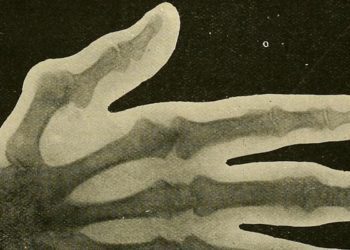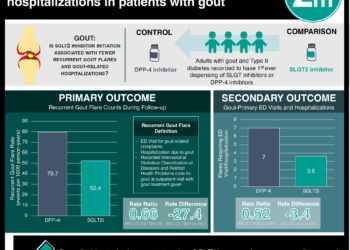Quarterly canakinumab administration associated with significantly reduced risk for gout attacks
1. Use of canakinumab was associated with reduced risk for gout attacks.
2. Canakinumab administration did not result in changes to serum uric acid levels.
Evidence Rating Level: 1 (Excellent)
Study Rundown: Gout is the most common inflammatory arthritis in adults, and its prevalence has increased substantially over the past several decades. In terms of therapy, most drugs that inhibit interleukin-1B have been shown to shorten gout attacks, but it is unclear whether they stop these attacks from occurring. The authors of this study examined the relationship of one of the common therapies for gout, canakinumab, and the lowering of serum uric acid levels (SUA) as well as frequency of gout attacks. Generally, they observed that quarterly canakinumab administration was associated with significantly reduced risk for gout attacks. However, they noted that the high cost of this drug could pose issues. The main limitation of this study was the fact that incidence reports of gout attacks did not require a physician’s diagnosis, meaning there was possible misclassification of gout attacks in analyses.
Click to read the study in Annals of Internal Medicine
Relevant Reading: Canakinumab reduces the risk of acute gouty arthritis flares during initiation of allopurinol treatment: results of a double-blind, randomized study
In-Depth [randomized controlled trial]: The authors conducted a secondary analysis of a randomized controlled trial to assess the relationship among canakinumab, a monoclonal antibody targeting IL-1B, SUA levels, and gout attack incidence among 10 059 participants. The study setting included patients from 39 countries and resulted in random allocation of the drug versus placebo, administered every 3 months. The overall incidence rate of gout among the intervention group was 0.38 attacks per 100 person-years, compared to 0.80 attacks per 100-person years in the placebo group. Canakinumab did not affect the overall SUA levels over time.
Image: PD
©2018 2 Minute Medicine, Inc. All rights reserved. No works may be reproduced without expressed written consent from 2 Minute Medicine, Inc. Inquire about licensing here. No article should be construed as medical advice and is not intended as such by the authors or by 2 Minute Medicine, Inc.






